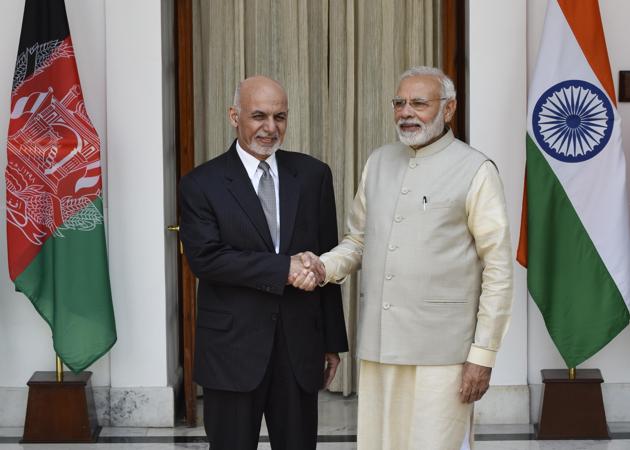How US policy in Af-Pak has hurt Indian interests | Analysis
India’s regional security approach has been cautious. It must capitalise on the goodwill it enjoys in Afghanistan
When United States (US) President Donald Trump joins Prime Minister Narendra Modi’s 50,000-strong public rally in Houston next week, it will showcase the strength of the US-India relationship. But the powerful symbolism should not blind us to the divergent US and Indian interests in India’s neighbourhood, especially the Afghanistan-Pakistan (Af-Pak) region. Indeed, before the rally, Trump will likely get the India trade deal that he has sought.

The collapse of the deal between the chief US negotiator, Zalmay Khalilzad, and the Afghan Taliban is unlikely to compel the US to adopt a long-term approach to the Af-Pak region so that it ceases to be the global hotbed of terrorism. Even if Trump had signed off on the deal, it would not have brought peace to Afghanistan. Indeed, it would have only triggered a new war between Afghan nationalists and Pakistan’s proxies.
Successive US presidents’ short-range approach to the Af-Pak region has fostered Afghanistan’s destabilisation, cemented the Pakistan military’s grip within the country, and meant enduring security costs for India.
How the Af-Pak situation directly impinges on Indian security has been apparent since the 1980s, when the US used Islam as an ideological tool to spur jihad against the Soviet military intervention in Afghanistan. Portions of the US Central Intelligence Agency’s (CIA) multibillion-dollar military aid to the anti-Soviet guerrillas (out of whom al Qaeda evolved) were siphoned off by the conduit, Pakistan’s Inter-Services Intelligence (ISI), to ignite an Islamist insurrection in the Indian state of Jammu and Kashmir (J&K). The Islamists demographically transformed the Kashmir Valley by expelling virtually all Kashmiri Pandits but not before kidnapping and murdering hundreds of them, including gouging out their victims’ eyes and gangraping women.
It was America’s Af-Pak policy — centred on rewards to Pakistan — that helped bring terrorism to India, including a vicious jihad culture to the Kashmir Valley. To undermine India’s internal security, the Inter-Services Intelligence just copied the CIA’s playbook against the Soviets in Afghanistan. The US’ relationship with the Pakistan army and ISI, despite ups and downs, remains cosy, emboldening their death-by-a-thousand-cuts strategy against India. Nothing can be more galling for New Delhi than the perverse equivalence Trump draws between India and Pakistan.
The now-scuttled US deal with the Taliban was proof that America not only negotiates with terrorists, but is also willing to get in bed with the killers of US soldiers. Trump’s plan to host Taliban and felicitate them as “peace makers” at Camp David was redolent of a 1985 White House ceremony where Ronald Reagan gestured towards several Afghan mujahideen and declared, “These gentlemen are the moral equivalent of America’s founding fathers.”
Like their procreator, Pakistan, the Taliban use terrorism as their main leverage. Pakistan’s investment in terrorism has been paying rich dividends to it and its proxies. The Taliban has forced the Americans to seek Pakistani support for a face-saving exit. The dividends are also apparent from the renewed US courtship of Pakistan.
The US, meanwhile, has increasingly turned its global war on terrorism into a geopolitical tool. The result is greater jihadism and terrorism. Last week, marking the anniversary of the 9/11 terror attacks, the US added more individuals and groups to its terrorism lists, including Noor Wali, the new head of the Pakistani Taliban. This outfit is the nemesis of the Pakistan military but poses no threat to the Afghanistan-based US forces, whose battlefield foe is the Afghan Taliban. Yet conspicuously missing from the US terrorism list is the Afghan Taliban or any ISI or other Pakistani military official. By contrast, the US has imposed terrorism sanctions on Iran’s Islamic Revolutionary Guards Corps and individuals with ties to it.
Three successive Pakistani Taliban chiefs have been assassinated in US strikes, with each killing designed to win Pakistan’s cooperation in Afghanistan. But, despite all its talk of counterterrorism cooperation with India, the US will not kill any of the India-wanted, Pakistan-based terrorists, also on the US terrorism lists. The $10 million US bounty on Hafiz Saeed since 2012, for example, is all for show.
In Afghanistan, a war-weary US is justifiably seeking to cut its losses. Ending the longest war in US history is integral to rolling back America’s “imperial overstretch” — a Trump goal. But to prevent the Taliban from recapturing power in Kabul, the US will have to keep a residual force. It can draw down its forces without making concessions to the Taliban and Pakistan. Its endless search for a Faustian bargain with the Taliban is engendering growing bloodshed in Afghanistan and imposing ever greater costs on Af-Pak’s neighbours.
For too long, India has taken a cautious and reactive approach to regional security issues. If it is not to be weighed down by the Af-Pak region, it must take a long-term view and become proactive. It should capitalise on the remarkable goodwill it enjoys in Afghanistan, where it is the favourite of the patriots in their fight against Pakistan’s proxies. Without putting boots on the ground, India must play a much bigger role in Afghanistan, including to safeguard the multibillion-dollar assistance it has provided that country, and to checkmate Pakistan.
Brahma Chellaney is a geostrategistThe views expressed are personal






